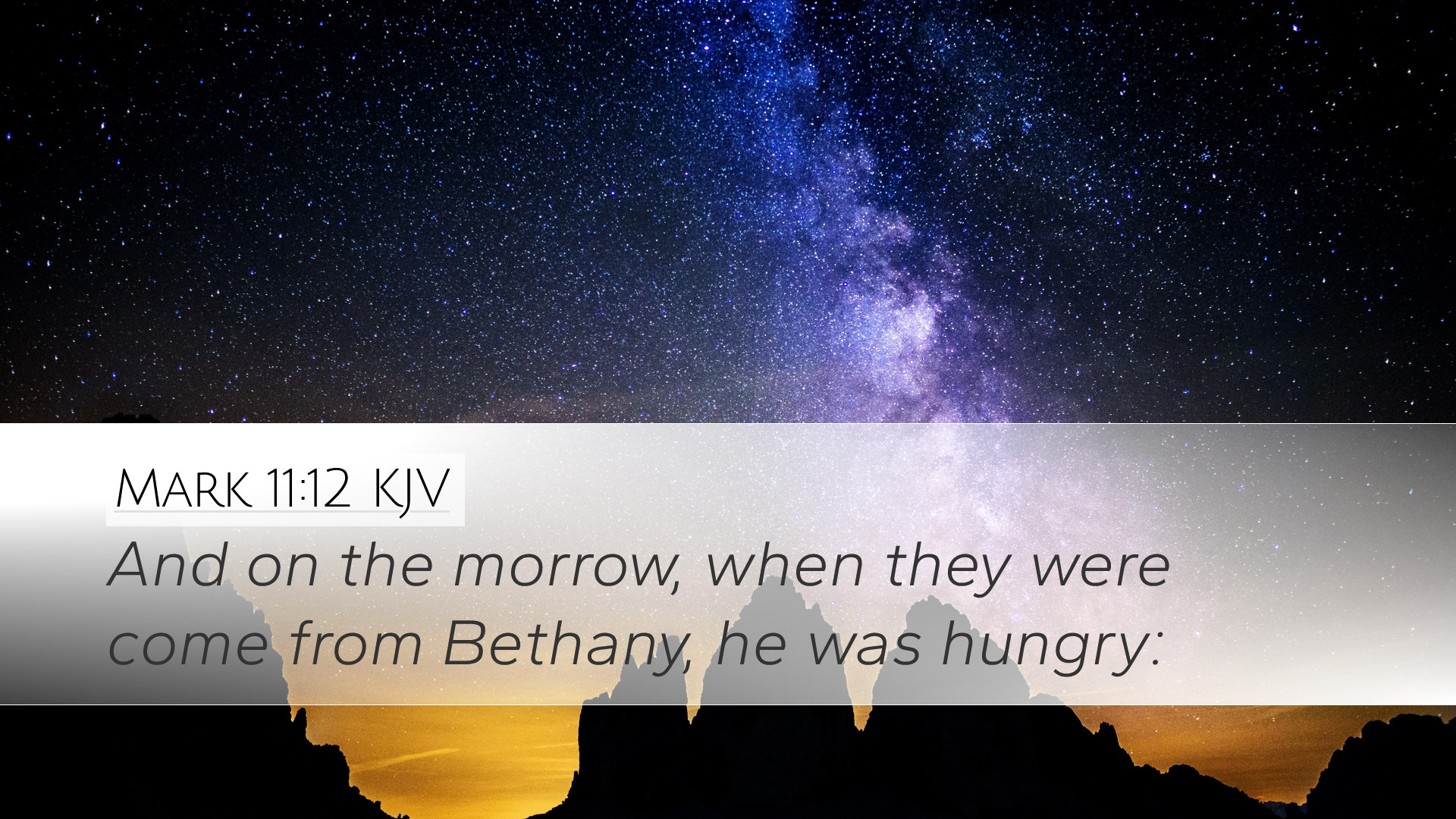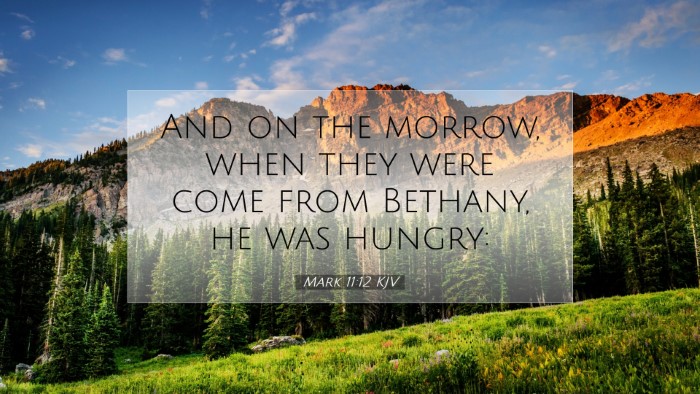Commentary on Mark 11:12
Mark 11:12 states, "And on the morrow, when they were come from Bethany, he was hungry." This verse serves as a pivotal part of the narrative that unfolds in the context of Jesus’ final week leading to the crucifixion. The intricacies of this passage have drawn the attention of numerous theologians and scholars who seek to derive deeper meanings from its simplicity.
Contextual Analysis
In order to fully grasp the significance of Mark 11:12, it is essential to consider the broader context of the passage. This moment occurs just after Jesus’ triumphant entry into Jerusalem, a fulfillment of prophecy and an assertion of His messianic identity. Matthew Henry notes that this event is marked by expectation both among the followers of Jesus and the religious leaders of Jerusalem.
The Setting
Jesus and His disciples are returning from Bethany, a small town near Jerusalem where He often stayed. This journey illustrates not only Jesus’ physical hunger but also serves as a metaphor for spiritual hunger—a recurring theme in His ministry. Adam Clarke posits that the mention of hunger emphasizes Jesus’ human nature, showcasing that He experienced the same needs and vulnerabilities as any other man.
The Symbolism of the Fig Tree
Upon seeing a fig tree from a distance, Jesus approaches it in hopes of finding fruit. However, the tree bears no fruit, which leads to a significant symbol within the narrative. Albert Barnes highlights that the fig tree representation is twofold:
- Israel’s Spiritual Condition: The fig tree symbolizes Israel, which at that time was not producing the spiritual fruit expected by God. This failure leads to judgment, reflective of Jesus’ prophetic role.
- Consequences of Unfruitfulness: The act of cursing the fig tree illustrates the dire consequences of lacking obedience to God’s directives. Henry elaborates that it serves as a warning against false appearances in faith.
Understanding Jesus’ Actions
Jesus’ cursing of the fig tree, as described in the verses that follow (Mark 11:13-14), poses philosophical inquiries about His motives. Why would Jesus, who is characterized by compassion, act in such a seemingly harsh manner? Clarke suggests that this is a teaching moment, intended to illustrate the importance of genuine fruitfulness in one’s spiritual life.
Theological Implications
In this brief account, layers of theological implications emerge. Each commentator offers insights that contribute to a comprehensive understanding of the passage.
- Jesus’ Humanity in Relation to His Divinity: The juxtaposition of Jesus’ hunger with His divine authority highlights the dual nature of Christ. While He has the power to perform miracles, He also embodies the full experience of human existence.
- Judgment Against Hypocrisy: The encounter with the fig tree acts as a foreshadowing of Jesus’ condemnation of the temple practices of the day. Matthew Henry articulates that just as the fig tree had leaves but no fruit, so too do the religious leaders exhibit an outward appearance of piety without true righteousness.
Practical Applications for Today
For pastors and theologians, the implications of this passage resonate in contemporary spiritual life. Here are key takeaways that can encourage reflection and action:
- Examining One’s Spiritual Fruitfulness: Believers are encouraged to assess their own lives for genuine spiritual fruit. The fig tree serves as a pertinent reminder for self-evaluation and authenticity within the faith community.
- Community Responsibility: The passage posits that communal spiritual health is as crucial as individual faith. Just as the fig tree's lack reflected broader spiritual barrenness, churches must strive to cultivate a culture of genuine belief and outreach.
- Understanding the Merciful Nature of God: Jesus’ actions prompt believers to appreciate the mercy of God that allows time for repentance and growth before judgment is rendered.
Conclusion
Mark 11:12 encapsulates profound theological truths through a narrative seemingly centered on a fig tree. Drawing insights from Henry, Barnes, and Clarke enables a layered understanding of this passage. The exploration of Jesus’ hunger reflects not just an earthly need but also highlights a deeper spiritual yearning amidst apparent unfruitfulness. Scholars, pastors, and students alike can glean from this commentary, reinforcing the call to cultivate true faith and bear fruit in an ever-watchful and expectant world.


